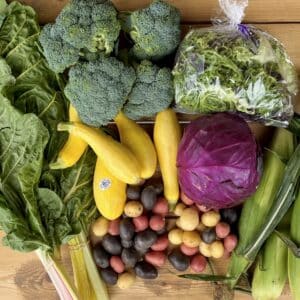Sustainably Farmed Food Shares for the week of
September 8, 2022
Shares
Vegan Share
Vegetarian Share
Omnivore Share
Vegan Produce* • Christiansen’s Pork Chops** • Lincolnshire Poacher
Omnivore Share Plus
Vegan Produce • Christiansen’s Lamb Chops** • Lincolnshire Poacher
Paleo Share
Vegan Produce • Canyon Meadows Ranch NY Steaks** • Christiansen’s Pork Belly** • BK Family Farms Eggs**
Meat Only Share
Christiansen’s Lamb Shoulder**
Add-ons and Upgrades
Specialty Grocery Add-on
Harissa by Villa Jerada
Cheese Upgrade
Cheese Upgrade
Monnalisa Fiorita
Fruit Add-On
Black Mission Figs*
Chocolate Add-on
Askinosie Special Edition Bourbon Barrel Aged Chocolate
Eggs Add-on
Juice Add-on
In-House, Fresh Squeezed Orange Juice*
Ingredient Features
Romano Beans
Romano beans are an Italian flat bean in the same family as garden variety string beans, which also counts fancy French haricots verts and yellow wax beans as siblings. They’re broad and flat—as if someone accidentally sat on a giant string bean—with a juicy, sweet flavor and great crunch. They can be a fun snack eaten raw but we love them in Asian-inspired stir fries or blanched and put on top of a salad. You can use them in virtually any recipe that calls for snap beans or other similarly crunchy veg like sugar snap peas. These beans are best during the summer, so take advantage of this seasonal green!
Lincolnshire Poacher
West Country Cheddar meets Comté in this cheese, which boasts a smooth, densely creamy texture and flavors that can range from rich, savory, and brothy to long, sweet, and almost pineapple-like. Although the loamy or clay soils of Lincolnshire are usually ill-suited to dairy farming, the lush pastures of Simon Jones’s Ulceby Grange farm sit on chalky land – and it is this, combined with the mild climate, that has made Lincolnshire Poacher one of very few cheeses to be produced on the east coast of the country. Though the farm has been in the family since 1917, the Jones family didn’t start making cheese until the 1990s, when a young Simon returned from agricultural college. Eager to turn his hand toward cheesemaking, he enlisted the help of renowned Welsh cheesemaker Dougal Campbell to develop a recipe, and the result – which incorporates the hallmarks of a hard mountain cheese into a traditional West Country Cheddar – proved so popular that customers at the local cheese shop initially had to be rationed to quarter of a pound each. Simon’s brother Tim has since joined him on the farm, and in 1995 Simon employed a full-time cheesemaker, Richard Tagg. Today, it is Jon Collins whose job it is to transform milk from their 230-strong herd of Holstein Friesians into cheese on an almost daily basis. Once the curds have been molded, salted, and pressed for 36 hours, the resulting cheese truckles are matured on wooden boards and turned regularly to ensure even maturation.
Monnalisa Fiorita
A soft Pecorino cheese made with sheep milk, MonnaLisa Fiorita (meaning “flourish” or “flower”) is named for the edible flourishing rind of this type of cheese. This is part of a Piedmont tradition that makes a milder version of the Tuscan sheep’s milk white mold rind. For Fiorita, the rennet is added to the milk, after pasteurization. The resulting curd is cut into large pieces to help retain moisture and is transferred into forms, which are then hand-turned multiple times to induce the whey to exit. The forms are sprayed with an aqueous suspension of Penicillium camemberti which, during the short curing, contributes to the formation of a foamy layer of white. Under this white surface of silky white edible mold, there is a delicate sweet taste, balanced with the cheese’s soft texture.
Harissa by Villa Jerada
Villa Jerada’s Harissa No. 1 is one of our favorite versions of this North African red pepper paste for its bright, complex flavor. While many store-bought varieties have a one-dimensional spicy flavor, this harissa layers acidity and fruitiness with preserved lemons, a touch of vinegar and tomato paste for a lively, tangy condiment. Villa Jerada uses just enough high-quality Moroccan olive oil to make the harissa spreadable and smooth without diluting its flavor, as opposed to conventional brands that contain a high proportion of water and vegetable oil.
